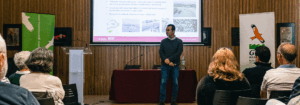
Grants
Sea
GOB Menorca | Regenerative Aquaculture
4,300 € awarded
TOTAL PROJECT COST – €7,200
IN PROGRESS
- Organisation Applying for Funding: GOB Menorca
- Project Duration: 15 months – August 2024 – December 2025
- Area of Interest: Sea – Restoration
- Other organisations involved: Marilles Foundation
THE PROJECT
Summary of the project
Regenerative aquaculture is an economic activity, little known, with numerous environmental and social benefits. From the organisation we believe that it should be made known through people who are dedicated to it, as well as visualising techniques and products that could be derived from this activity. The project consists of organising one conference a year with successful experiences to encourage this type of cultivation in Menorca and at the same time encourage the Port of Maó to combine its main activity, nautical sports, with more sustainable activities.
Environmental or Conservation Issue
Regenerative aquaculture has proven to be an economic activity that addresses different issues such as climate change (bivalve farming fixes CO2) and biodiversity loss (the diversity of farmed species creates small ecosystem refuges). In this case, by introducing this type of cultivation, the aim is to encourage professional fishermen to engage in a regenerative economic activity instead of an extractive one.
It also seeks to encourage the Balearic Islands Port Authority to diversify its economic activity and not focus exclusively on the nautical sector, thus tackling the problem of nautical overcrowding on the island.
Project Details
The cultivation of invertebrates on the northern shore of the Port of Maó was very important until the 1970s, but due to the contamination of the waters by heavy metals, the activity was interrupted for years. When the activity was resumed, it lost much of its importance and nowadays there are only two companies dedicated mainly to mussel cultivation. One of the biggest obstacles for these companies is that the port management, the Port Authority of the Balearic Islands, is making it increasingly difficult for them to continue their activity in order to increase the supply of nautical activities.
The organisation believes that by helping the shellfish gatherers to preserve their activity, we could break the current trend that focuses the entire economy of the bay on sports sailing and passenger transport.
If we get shellfish farmers to diversify their activity to implement regenerative aquaculture, cultivating different species of molluscs, marine invertebrates and algae in the same space, these facilities would become small oases of biodiversity that would favour an increase in the biomass of fish, which could end up colonising the areas outside the farm. In addition, this type of aquaculture also has the capacity to improve water quality and retain large amounts of carbon.
Another objective of this project would be to convince different users, such as professional fishermen, to redirect extractive fishing efforts such as traditional fishing towards a commercial activity with proven environmental and economic benefits.
Currently, according to the Maritime Space Management Plans (Order APA/524/2019 of 26 April), in the Balearic Islands there are only two areas permitted for the production of molluscs and other invertebrates BAL 1/01 (Port of Maó) and BAL 1/02 (East Coast of Menorca). For this reason, we believe that it would make sense to introduce this type of cultivation in Menorca and for the island to become an example for other Mediterranean territories to follow.
Although the aim is to open the conference to all audiences, the target audience would be fishing professionals, shellfish farmers and coastal managers.
Objectives:
– To raise awareness of regenerative aquaculture.
– To encourage shellfish farmers to adopt this type of farming.
– To promote the migration of professionals from extractive fishing to a regenerative activity.
– To encourage the diversification of economic activities in the Port of Maó to prevent it from focusing exclusively on increasing the nautical offer.
Methodology:
Two sessions of one morning plus lunch are planned with the following format:
– First session, October 2024 – Get to know regenerative aquaculture.
Detailed introduction of what regenerative aquaculture is and its environmental, social and economic benefits.
Depending on the time of the introduction and the person giving it, one or two presentations explaining successful experiences in regenerative aquaculture.
– Second session, first or fourth quarter of 2025 – Regenerative aquaculture in Menorca, techniques and products that could work.
General introduction to regenerative aquaculture to refresh concepts.
Presentation on techniques used for regenerative aquaculture that could work in Menorca.
Presentation on viable products that could be cultivated in Menorca.
After each presentation there will be a space for interaction so that attendees can raise questions, doubts and fears.
Between the two presentations there will be a coffee break to encourage interaction between participants.
At the end of the day, a joint lunch is proposed. This event has proven to be very effective for effective interaction between some attendees and the speakers.
Expected results:
– To reach the maximum possible audience.
– Convince at least one of the shellfish farmers to diversify their production.
Long-term results:
– To restore the importance of the invertebrate farming economy to the northern area of the Port of Maó BAL 1/01.
– To encourage the creation of regenerative aquaculture farms in the BAL 1/02 Zone (East Coast of Menorca).
– Encourage the migration of professional fishermen to the regenerative farming business.